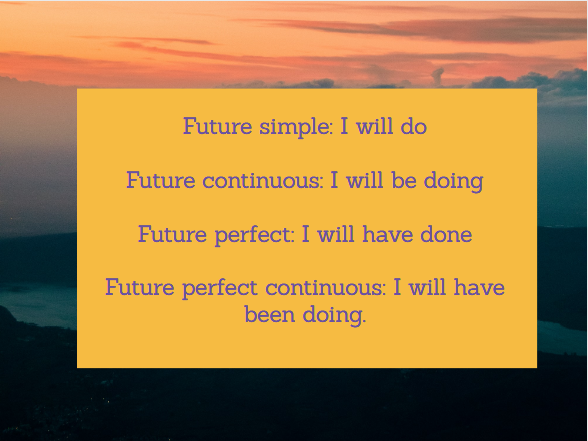The future tenses in English.
There are 4 main future tenses in the English language.
They are:
future simple: I will do
future continuous: I will be doing.
future perfect: I will have done.
future perfect continuous: I will have been doing.
In addition to these there is also:
- Present continuous used for the future e.g. ‘I’m playing football next Saturday.’
- ‘Going to’ e.g. ‘I am going to speak to him tomorrow’.
- Timetable future i.e. the future when referring to organised or scheduled events particularly transport, e.g. ‘The next flight to New York leaves at 7pm’ or ‘The next train to Edinburgh departs at 11 am’.
- Immediate future, ‘about to’. This is used to refer to something you are just going to do at this very immediate moment, perhaps even a few seconds later e.g. ‘It’s 12.59 and it’s just about to become 1pm so the alarm will ring’ or ‘I’m just about to go in to the shower now, so I can’t talk’.
So now let’s go back to the four main future tenses.

- The future simple.
The future simple is ‘will do’.
We use this to talk about future actions e.g. ‘I will go to school tomorrow’.
It is formed with ‘will + verb’.
It is often to talk about the beginning of a future action, whereas when you are in the middle of an incomplete future action you use the future continuous.
For example, your Maths class is from 9 am to 11 am.
You would say: ‘I will start my Maths class at 9 am’ but ‘At 10.30 I will be studying in my Maths class’ because you are in the middle of that action.
Also we can often use the present continuous interchangeably with the future simple for many sentences e.g. ‘I will watch a film at 5 pm’ or ‘I am watching a film at 5 pm’.
In grammar books it is often said that the present continuous is for arranged events which you are certain about, and the future simple is stronger. However in actual spoken English, native-speakers are not too bothered if you use the future simple or present continuous for many different actions. They are interchangeable a lot of times.
2. Future continuous
The future continuous is used to talk about when you are in the middle of an action or event.
It is formed with ‘will + be + …ing verb’.
For example you usually eat dinner from 7 to 7.20 so you might say ‘Don’t phone me at 7.15, I will be eating dinner’.
You have started the action but have not finished.
Watch this video to learn more about the differences between the future simple and future continuous.
3. Future perfect.
The future perfect is used to talk about a future action or time which happens before another future action or time.
It is formed with ‘will + have + past participle’.
For example, ‘I will have eaten my breakfast before I leave home.’
The ‘first future’ here is you eating breakfast. It is completed before the second future, you leaving home. So we say ‘will have eaten breakfast’.
You could say ‘I will eat my breakfast before I leave home’, but the difference is that this implies this is your intention, whereas if you say ‘I will have eaten my breakfast before I leave home’ it is more certain that this will happen.
Look at these examples:
We can see that the first action completed earlier is used in the ‘future perfect’.
Look at the diagram below.
David jogs every morning between 8. to 8.30
You want to phone him at 8. He says ‘No, I will jog at 8’. It means he will start the action.
You want to phone him at 8.15. He says ‘No, I will be jogging at 8.1.5’. It means he is in the middle of the action.
You want to phone him at 8.30 or after then. He says ‘OK, I will have finished jogging by then’. It means he is at the end of the action or completed it.
4. The future perfect continuous.
The future perfect continuous is:
- Like the future perfect, an action before another future action or time but incomplete and may continue.
For example you could say: ‘I will have read the book by this weekend so will be ready for the exam’. It means you will have finished the book.
However if you say: ‘I will have been reading the book for a few days by this weekend.’ It could mean that you will continue to read the book after the weekend. It does not necessarily mean the action is complete but it could be incomplete or continuing.
2. It can be linked to a time period e.g.
‘I will have been jogging for 15 minutes by 8 am so I may be sweaty.’
‘I will have been studying English for 3 months by August so my English should be much better then.’
‘I will have been living in London for 6 months by this September so hopefully I will be used to the weather then.’
3. It can also be used to refer to a reason.
‘It is June now but I think I will be able to understand American movies much better in December, I will have been practising English for 6 months by then.’
‘It is January now but, he will look much slimmer by April, he will have been exercising in the gym for 3 months by then.’





